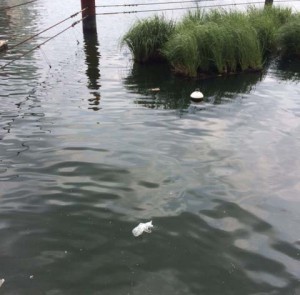Baltimore Disposable Bag Bill
In late April, Baltimore was slammed by three consecutive days of torrential rain. Storms come and go in this city though, and after a few days of sunny skies, memories quickly fade. This particular bout of severe weather will be ingrained in the local memory for some time however, thanks to the collapse of a portion of East 26th Street that occurred likely as a result of stormwater erosion.
Infrastructure failure is not a regular occurrence during storm events, so when it happens, it receives a lot of attention and draws the public eye to existing problems. One such problem that does not receive as much attention as say, the collapse of an entire street, but one that happens during every rainstorm without fail is the accumulation of literally tons and tons of trash in Baltimore’s waters, swept by the rain into the city’s stormwater system. Plastic bags make up a significant percentage of this garbage, and after the rains subside they can be seen floating like jellyfish in the harbor and all along Baltimore’s rivers and stream, stranded and strewn among the branches of trees along the shoreline.

Litter has long been a problem in Baltimore and with a few exceptions the efforts to deal with the problem has been largely unsuccessful. The city has recently seen moderate success with its street sweeping efforts, and earlier this year, a trash-collecting water wheel began operation with the ability to collect 50,000 pounds of trash per day. These actions are commendable, and have even generated national attention, but they only address the symptoms of the problem and fail to get at the cause. Instead, the prevention of plastic bags litter should be the primary policy goal of the city.
On April 28th, Councilman Jim Kraft introduced a bill to impose a 5-cent fee on disposable plastic bags. Attempts to pass such legislation and join the nearly 100 other communities across the nation that already have them in place, are not new to the city. A similar bill was introduced this past January that set the fee at 10 cents. Despite widespread public support, it failed to be voted out of committee. With the fee cut in half and support from several major retail chains, the outlook for passage this time around looks good, but some opposition still remains.
There are questions as to where the 5-cent fee will go. Will it disappear into the city’s general fund to be used on who-knows-what? Isn’t it really just a tax? No and no. First, the language of the bill is currently being clarified so that the revenues will be used only for cleaning up the city. This may mean that money collected will be used to purchase and distribute, low cost or no cost, reusable bags to city residents; pay for the maintenance and upkeep of trash interceptors; cleaning parks, neighborhoods, and open space; or some combination of the three – it has yet to be determined for sure.Regardless, it will not be lost in the city’s general fund.
It should also be noted that this bill is not intended to raise revenues for the city, it is meant to change behaviors by incentivizing residents to forego using disposable bags. Second, it is not a tax because not everyone has to pay it. Only those that make the choice not to bring a reusable bag shopping are subject to the fee. It’s the same idea as charging a fee to park at the beach or obtain a fishing license, only those who make the choice to park or fish have to pay.
Another argument frequently put forth by opponents is that it will burden small businesses in the community. It won’t. In Washington D.C. and Montgomery County, where 5-cent bag bills have been in place for a few years, no business has reported declining sales because of bag laws. Instead, most of them actually report significant savings because they don’t have to buy as many bags to give away. In addition, they can make additional profit by selling reusable bags in their stores, not to mention the small portion of the bag fee (1.5 cents) that they get to keep for themselves. So long as the language of the bill also includes a fee on paper bags, so customers are not incentivized to use them instead of reusable bags, which are more expensive, businesses should be supportive of the fee.
Litter is a complaint common to all neighborhoods in Baltimore, from east to west and from the Inner Harbor to the city/county border. It is unsightly, harmful to public health, and bad for the environment. A fee on disposable bags will not fix the litter problem overnight, but it can work to influence a change in behavior in the long run by encouraging the use of reusable bags. It is but one piece of the litter puzzle, but an important one that can reduce the amount of trash in our neighborhoods and waterways and make for a better Baltimore.
Article by: John Berard, Senior Manager for Advocacy and Public Policy at Blue Water Baltimore
Follow John Berard on Twitter to learn more on this topic.
